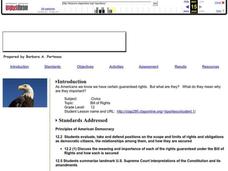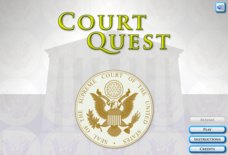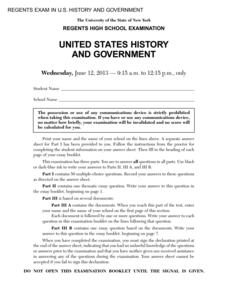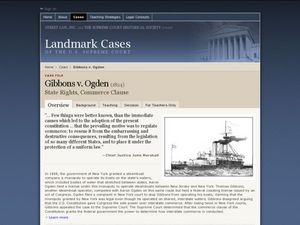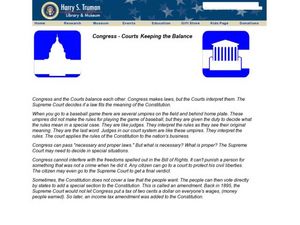Curated OER
Symbolic Speech
Ninth graders consider the right of freedom of speech as it is outlined in the U.S. Constitution. They receive background information for the US Supreme Court, the Bill of Rights, and free speech. They discuss a series of actual cases...
Curated OER
From Tinker to Fraser: Freedom of Speech in Public Schools
The Tinker and Fraser cases were taken the Supreme Court on the basis of the 1st Amendment right to Freedom of Speech. Learners discuss each case, the First AMendment, complete handouts, and conduct a role play activity. Handouts are...
Curated OER
Bill of Rights
Twelfth graders list, describe, and illustrate the specific rights guaranteed to individuals and how they are secured. Then they examine landmark Supreme Court cases, such as, Airport Commissioner vs. Jews for Jesus, New Jersey vs. TLO,...
Curated OER
Boundary Crossing
Seventh graders explore the issues that arose as a result of boundary crossing. For this US History lesson, 7th graders research supreme court cases in regards to crossing boundaries. Students present their findings to the class.
State Bar of Texas
Gibbons v. Ogden
Have you ever played the game Monopoly? Do you know what it takes to win the game correctly? Scholars research the nature of outlawing monopolies in the United States while controlling trade. They investigate the court case Gibbons v....
Administrative Office of the US Courts
Hazelwood v. Kuhlmeier
Freedom of speech is not always free. Scholars investigate how the First Amendment provides for the right to express opinions. Through the court case Hazelwood v. Kuhlmeier, they analyze free speech using primary documents—and hopefully...
Ohio Center For Law-Related Education
Four Activities: Thurgood Marshall and the Nomination and Confirmation of Federal Judges
The process of nominating and confirming federal judges can sound like a lot of bureaucratic hoops, but a resource breaks down the steps of the Supreme Court nominations in a simpler manner. Learners participate in four activities that...
Curated OER
State v. Russell, Minnesota Supreme Court
Students examine the impact of court decisions. In this Minnesota Supreme Court lesson, students read the State v. Russell case study regarding cocaine drug use. Students take notes on the case and respond to discussion questions...
iCivics
Court Quest
Introduce your learners to the federal and state court systems with a fun, interactive online video game! After reading sample cases, class members identify to which court the case should be assigned and gain a greater understanding...
Curated OER
In the Courts
Students explore desegregation in the courts. In this civil rights lesson, students listen to their instructor present a lecture on Supreme Court cases Brown v. Board of Education and Plessy v. Ferguson. Students examine the cases and...
Administrative Office of the US Courts
Elonis v. U.S.
With the explosion of social media sites, with online threats and cyber bullying, issues of freedom of speech have taken on a whole new aspect. Elonis v. U.S. represents the first time the Supreme Court has considered whether or not...
PBS
Understanding and Applying the Miranda Decision
How does the Supreme Court Miranda decision affect court cases? Scholars watch a video about the decision, discuss its application in various cases, fill out multiple handouts, and work in groups to better understand how much weight the...
PBS
Explicit and Implicit Language – Interpreting the Meaning of the Fourteenth Amendment
How do Supreme Court justices interpret amendments to the Constitution? The resource helps answer that question by discussing how people use explicit and implicit language to interpret the meaning of the Fourteenth Amendment. Learners...
New York State Education Department
US History and Government Examination: January 2012
What led to the United States Civil War? Interested historians consider a variety of political, social, and economic factors using primary sources and an essay prompt in an authentic high-stakes test. Primary sources include political...
New York State Education Department
US History and Government Examination: June 2013
How successful has American foreign policy been in the past? Pupils consider the question as part of a state examination in American history. Other prompts include a document analysis and essay of important civil rights cases decided by...
Newseum
Compare Coverage of Brown v. Board Ruling
Young journalists analyze how The Topeka State Journal, the Jackson Daily News, and The Providence Journal reported on the 1954 Supreme Court decision in Brown v Board of Education. Scholars scrutinize the headlines, photographs,...
Heritage Foundation
Procedural Amendments: Amendments III, IV, and V
So many US Constitution clauses, so little time. The 17th installment in a 20-part series teaches pupils about the Third, Fourth, and Fifth Amendments. Learning through activities such as group work, connecting to current events, and...
Curated OER
Making the Supreme Court Matter to Teens
Here are lessons and ideas to help social studies teachers enlighten students about the importance of the Supreme Court.
Curated OER
Mapp v. Ohio (1961)
Students examine warrantless searches and due process. For this Supreme Court lesson, students examine primary documents from Mapp v. Ohio and discuss the implications of the decision.
Curated OER
Gibbons v. Ogden (1824)
Students examine state rights and the commerce clause. For this Supreme Court lesson, students examine primary documents from Gibbons v. Ogden and discuss the implications of the decision.
Curated OER
United States v. Nixon (1974)
Young scholars examine checks and balances. In this Supreme Court lesson, students examine primary documents from United States v. Nixon and discuss the implications of the decision.
Curated OER
Miranda v. Arizona (1966)
Students examine Miranda v. Arizona. In this court decisions lesson, students analyze the self incrimination case and read other supplemental articles about police procedures and due process. Students discuss the Supreme Court decision...
Curated OER
Dred Scott v. Sandford
Young scholars examine the issues of slavery and due process. In this Supreme Court lesson, students examine primary documents from Dred Scott v. Sandford and discuss the implications of the decision.
Curated OER
Congress - Courts Keeping the Balance
In this checks and balances in U.S. government worksheet, students read a 5-paragraph selection regarding Congress and the Supreme Court and then respond to 3 short answer questions.
Other popular searches
- Landmark Supreme Court Cases
- Famous Supreme Court Cases
- Racism Supreme Court Cases
- U.s. Supreme Court Cases
- Supreme Court Cases Poster
- Us Supreme Court Cases




